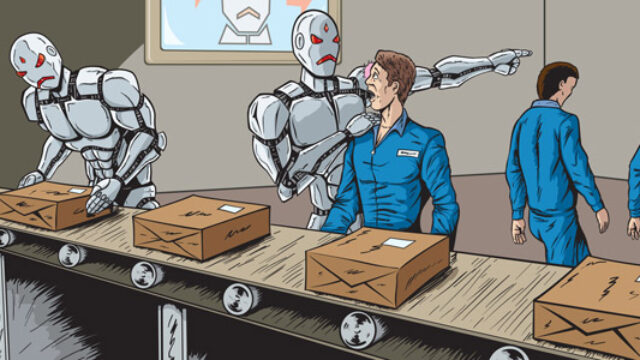Mamdani Speaks to the AI Generation’s Casualties

Skeptics of artificial intelligence’s capacity to replace human beings felt vindicated in June when Apple researchers concluded that current large reasoning and large language models remain light years away from possessing human-like powers of cognition. Whether these models were able to solve puzzles efficiently depended on whether those puzzles were familiar, indicating that AI’s ability to resolve complex problems depends less on reasoning than on familiarity with the training data.
That AI still falls short of the capabilities of old-fashioned human brains should come as no surprise. Nor should it be a surprise that the shortcomings of AI won’t stop employers from using “good enough” AI to replace flesh-and-blood people in the workforce wherever possible. According to Marc Benioff, the CEO and co-founder of Salesforce, AI already does about half of the work at his company today.
The praise for his technology came after Benioff slashed 1,000 positions at Salesforce this year. And he’s not the only tech boss taking advantage of AI’s potential to shrink his payroll.
In May, CrowdStrike, a major cybersecurity firm based in Austin, announced that it would fire 500 employees. CEO George Kurtz justified the move on the grounds that “AI has always been foundational” to the company’s operations.
“AI flattens our hiring curve, and helps us innovate from idea to product faster,” Kurtz said. “It streamlines go-to-market, improves customer outcomes, and drives efficiencies across both the front and back office. AI is a force multiplier throughout the business.”
Cutting through the corporate jargon, Kurtz, like Benioff, is saying that AI will enable CEOs to pad their bottom lines by providing them with a way to trim the fat: that is, humans. Amazon boss Andrew Jassy has been among the bluntest about this emerging fact of life. In a memo to staff, he said that the company expects AI to reduce its “total corporate workforce.”
It seems like just yesterday workers were assured that white-collar jobs in tech companies were the way to attain professional and financial stability. But that dream has been quietly vanishing, perhaps for longer than people realize. Now, set that against eroding standards of living, and things have become bleak for many Americans.
According to the Ludwig Institute for Shared Economic Prosperity, most Americans do not meet its “Minimal Quality of Life Index,” which takes into account everything from the cost of living to food and shelter. In their view, the main culprit is that wages have failed to keep pace with rising costs. There is now the additional problem of well-paying jobs being crushed beneath algorithmic steamrollers.
What happens next? I do not want to read too much into the mayoral primary victory of democratic socialist Zohran Mamdani in New York City, which seems to have shocked so many conservatives. President Donald Trump himself declared Mamdani a “Communist Lunatic.” And yet, an analysis by the Gothamist found that Mamdani won 30 percent of the districts that Trump won in 2024. Mamdani’s campaign—which was carried by young people—reclaimed votes from neighborhoods that swung hard toward Trump in November.
Did these voters become pro-“Communist Lunatic” overnight? It’s doubtful. What’s more likely is that Americans are feeling squeezed to death, trapped in a rat race, and as though they are watching the finish line become further out of reach.
The “good jobs” they went to college to get are beginning to fade away—casualties in, among other things, the AI revolution. Mamdani identified these realities and spoke to them. Whether he spoke with truth or whether he’ll be able to govern well is, as always, another matter altogether. But I suspect that as the wheel of technological “progress” turns, powered by the greed of people like Benioff, you’re going to see more politicians like Mamdani, who will find no shortage of economic anxiety to exploit.
https://chroniclesmagazine.org/web/mamdani-speaks-to-the-ai-generations-casualties/
